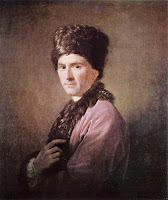 I used to be a universalist. While I never disputed the existence of hell, I did believe that the fire of hell served the purpose of a temporary purifying process. Judgment and damnation, I argued, would be God’s way of eventually persuading everyone from Hitler to Stalin (and maybe even the devil himself) to accept Jesus Christ as their personal saviour. It might take a long time, but in future aeons everyone would be given a second chance and allowed to “graduate”, if you will, into heaven.
I used to be a universalist. While I never disputed the existence of hell, I did believe that the fire of hell served the purpose of a temporary purifying process. Judgment and damnation, I argued, would be God’s way of eventually persuading everyone from Hitler to Stalin (and maybe even the devil himself) to accept Jesus Christ as their personal saviour. It might take a long time, but in future aeons everyone would be given a second chance and allowed to “graduate”, if you will, into heaven.I was not simply a universalist, but a universalist with a mission. I made it my personal crusade to convince the entire Christian world to abandon belief in endless hell fire. I wrote two books on the subject and even challenged well-known Bible scholars to public debates. (Douglas Wilson and I had a lengthy debate on the subject which I later published.)
I stopped being a universalist about seven years ago, after I became convinced that the Bible did not teach the salvation of all men. While there were still a number of things that didn’t make sense to me about the doctrine of eternal damnation, I realized that in good conscience I could no longer teach my children that the Bible taught universal salvation.
With the recent publication of Rob Bell’s Love Wins, the question of hell and universalism has been thrust into the public limelight. Likewise, I have found myself returning to the question with a renewed interest. As I have watched numerous conservative pastors, scholars, theologians and bloggers rise to the occasion of exposing the errors of Rob Bell, I hoped that some of my lingering confusions about endless hellfire might be answered or at least addressed. So far I have been disappointed in this regard. All the responses to Rob Bell’s universalism (at least those I have read or watched) simply regurgitate the same pat answers without deeply grappling with some of the legitimate questions that Rob Bell has raised.
Moreover, many of the responses to Rob Bell hinge on straw man arguments, as if Rob Bell is denying the reality of God’s judgment. He is not; rather, he is questioning the existence of non-redemptive judgements. Universalism is not only fully compatible with a belief in God’s judgment, but certain types of universalism (including Rob Bell’s variety) actually hinge on judgment, since judgment is an instrumental process used by God’s love to bring all souls to a place of repentance and subsequent salvation.
This does not mean that I go along with Rob Bell. His book is woefully lacking in responsible exegesis or theological clarity. But this does not mean that his questions can be ignored. Throughout church history the process of answering heretics has led to some of the richest and most profound expressions of Christian orthodoxy (I have in mind some of the early Christeological disputes particularly). Rob Bell may be a false teacher, but the larger issues he is raising surely deserve to be adequately addressed, just as the church addressed the arguments of Arius in the 3rd and 4th century. Unfortunately, Bell’s emergent church orientation, together with his pop-style of writing, has made it all too easy for conservative scholars to dismiss his questions without doing adequate justice to the legitimate questions he is asking.
I have one good friend who, over a period of about a month, watched and read everything she could find on the internet refuting Love Wins. Since she was personally struggling with the issue, she hoped to find a good conservative response to Rob Bell’s questions. Eventually she came to me in frustration and said, “No one seems to be adequately engaging with the issues he’s raising.”
It is my hope that in posting some of the basic questions here, and framing them with (hopefully) some degree of theological clarity, I will be able to tap into the public debate which already exists and refocus the terms of the public discussion. But first, it may be helpful to share some biographical details so everyone knows where I am coming from personally. Thus, this post will be divided into the following three parts.
1. Why I used to be a universalist
2. Why I stopped being a universalist
3. Some remaining questions








